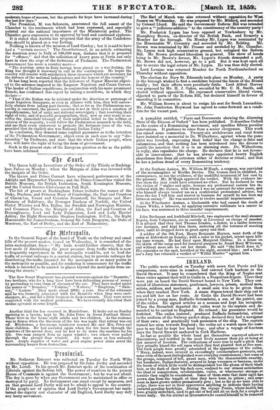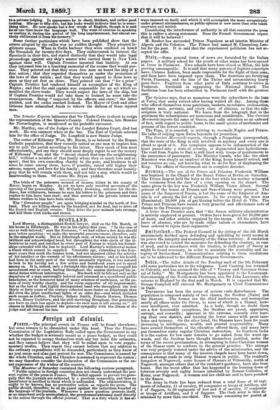IRELAND.
The public were startled on Tuesday with news that Poetic, and his companions, sixty-nine in number, had entered Cork harbour in the David Stewart. It may be remembered that the King of Naples sent those exiles against their will to Cadik in a Neapolitan frigate. There they were put on board the David Stewart bound to New York. They con- sisted of illustrious statesmen, gentlemen, lawyers, priests, medical men, artists, soldiers, and mechanics. A small sum was to be given them when they reached New York. A steam frigate towed their ship out to sea and left her on her route. At Cadiz the David Stewart had been joined by a young man, Raffaello Settanbrini, a son of the patriot, one of the exiles. He signed articles as a seaman and kept his incognito. When the Stromboli departed the exiles went to the captain and de- manded to be carried to England. He refused ; his guarantee would be forfeited. The exiles insisted; produced Raffaele Settembrini, attired in the uniform of the Galway packet ships, declared they had a navigator of their own ; and practically took possession of the ship. The captain turned her stem towards England ; the exiles set a watch upon the com- pass to see that he kept her head true ; and after a voyage of fourteen days the David Stewart anchored in Cork Harbour. As fast as possible the Whole band got themselves conveyed ashore to Queenstown, and testified in the most lively manner their joy at being at last assured of freedom. The enthusiasm of some rose to such a pitch that they actually kissed the soil upon which they first planted foot as free men. The Cork people were greatly astonished at the appearance of the exiles. "Many, indeed, were arrayed in exceedingly commonplace garments, and some even of Commit distinguished wore everyday countenances ; but some of the groups, composed of tall, gaunt men, with the characteristic swarthy, but handsome, Italian features, arrayed in large wrappers or burnous, under the hoods of which little could be distinguished but the gleam of their black hair, or the flash of their big dark eyes, realized to our utmost satisfaction the ideal of conspirators, revolutionists, exiles, or whatsoever strange or terrible they might be considered. Soule of them state that their sight has grown dim from the length of time they have been in prison ; and some seem to have grown rather prematurely gray ; but as far as we were able to judge, there was not in their appearance anything to indicate their having endured peculiar hardships. During the voyage Poerio, whose health has been greatly enfeebled, used to get out of bed and sit on deck for a couple of hours daily. On his arrival at Queenstownhe causedhimself to be removed to a private lodging. In appearance he is short, thickset, and rather good looking. His age is fifty-five, but his looks would indicate that he is some- thing older. He now speaks but a few words of English, though it is said he at one time knew the language well. The want of exercise in speaking or reading it, during the period of his long imprisonment, has almost en- tirely obliterated it from his memory."
Some further particulars which have been published show that the course adopted by the exiles was no sudden thought. They adopted le- gitimate means. When in Cadiz harbour they were confined on board the Stromboli for twenty-five days. They endeavoured to interest the Spaniards in their fate, and stated distinctly that they would take legal proceedings against any ship's master who carried them to New York against their will. Captain Prentice incurred that liability. At sea they informed him in a touching memorial of the course they would pur- sue. They pointed out that they were free men on board the ship of a free nation ; that they regarded themselves as under the protection of the laws of that nation ; and that they would appeal to those laws as soon as they set foot on shore. They pointed out that "for a price " Captain Prentice had rendered himself an accomplice of the King of Naples ; and that the said captain was responsible for an act which re- sembled the slave-trade. They would respect the laws of the ship, but if Captain Prentice would not take them to Ireland he must take the consequences. Being "respected by the officers and crew," the latter yielded, and the exiles reached Ireland. The Mayor of Cork and other citizens have subscribed funds to relieve the distress of these injured men.
The Leinster .Express intimates that Sir Cherie Coote is about to resign the representation of the Queen's County. Colonel Dunne, late Member for Portarlington, is mentioned as his probable successor.
Mr. Martley, one of the Judges of the Landed Estates Court, died last week. He was eminent when at the bar. The Earl of Carlisle selected him for the office of Judge. Dr. Longfield is now Senior Judge.
The rector of Kilkenny West, Mr. Bryan is so beloved by the Roman Catholic population, that they recently united as one man to implore him not to quit the parish according to his intent. They speak of him most affectionately, and say they should most deeply regret to see the rectory of Kilkenny West, and the "decent church that tops the neighbouring hill," without a member of that family whom they so much love and re- spect ; that his own exceeding charity to the poor, and kindness to all since he came among them, have, if possible, raised still higher their esteem) respect, and kflre for his family; and they therefore most humbly pray that he will remain with them, and not take a step which would be heartrending to them. Of course Mr. Bryan yielded.
The trials of the prisoners accused of treason felony in the county of Kerry, began on Monday. As yet we have only received accounts of the opening of the proceedings. Mr. M'Carthy Downing, solicitor for the de- fence, has withdrawn because he says his letters to the prisoners and their replies to him have been read ; and that several of his private letters and letters written to him have been stolen.
The " Gweedore people" are again bringing scandal on the north of Ire- land, They are killing sheep by the hundred, not for food, but to drive off the Scotch and English owners. They drive the poor animals into swamp's, and kill them with sticks and stones.



























 Previous page
Previous page